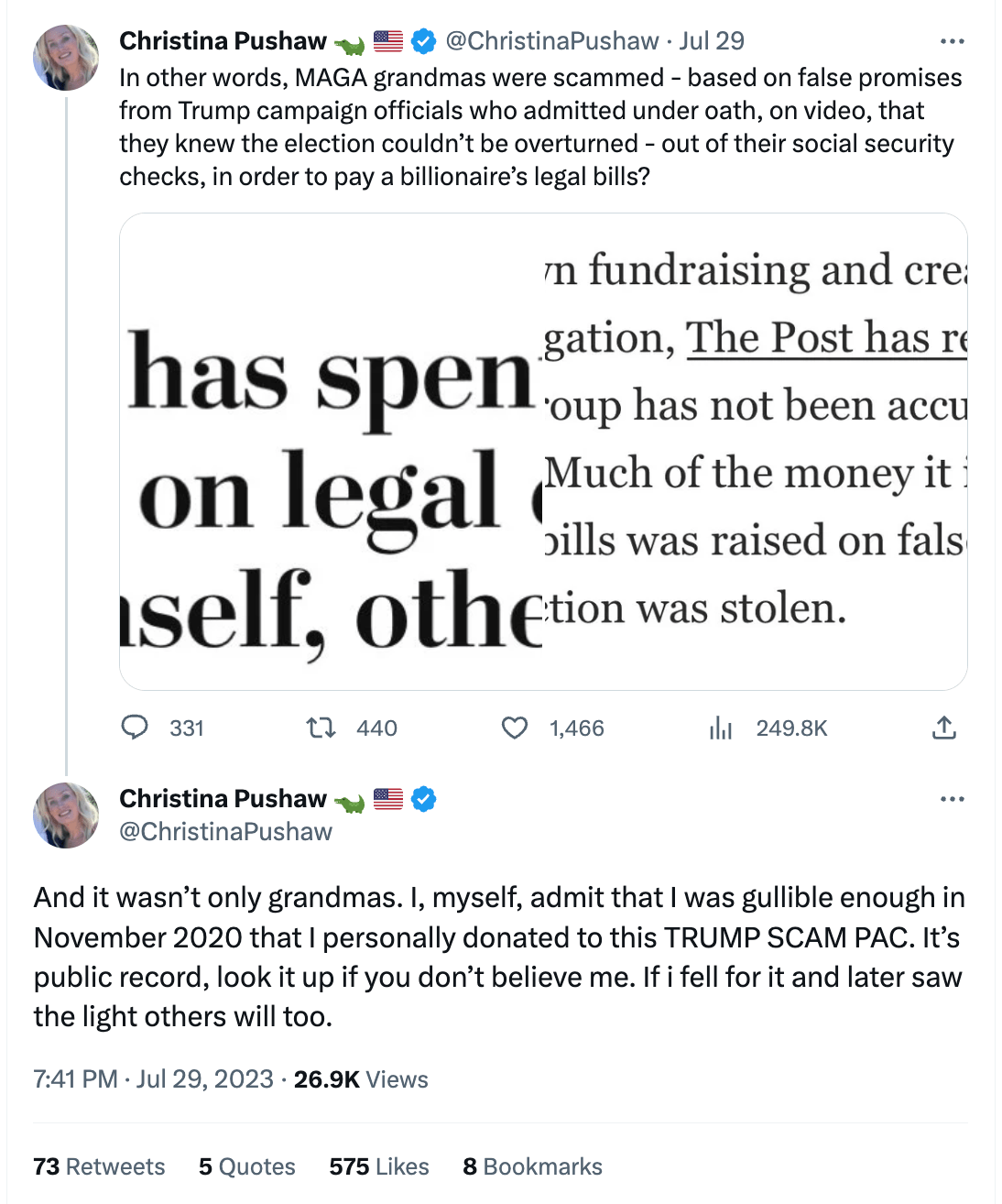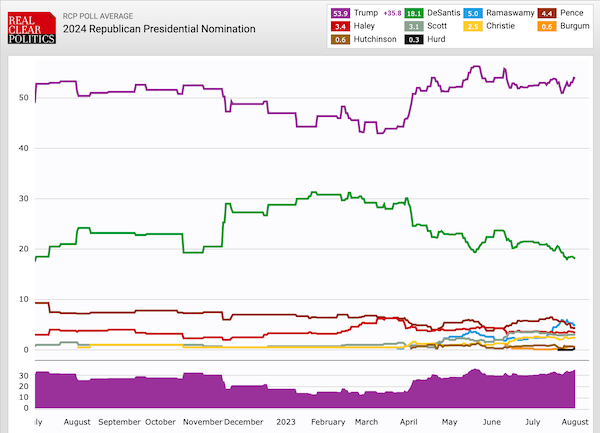Christina Pushaw is in trouble.
Pushaw has worn many hats for Ron DeSantis since 2021, from press secretary in the governor’s office to staffer on his reelection campaign to, presently, director of rapid response for his presidential run. Her official title at any given moment is academic, though her role has always been to serve as DeSantis’ ambassador to Twitter. Head spokes-troll, if you will.
It was Pushaw, for instance, who mainstreamed the term “groomer” among grassroots Republicans to describe critics of DeSantis’ so-called “don’t say gay” law. When a survey revealed that some queer parents were thinking of leaving Florida for fear of how that law might affect their children, she cheerily posted a “waving hand” emoji bidding them adieu.
She’s a demagogue’s demagogue, a populist snarl personified that defines DeSantis’ social media “brand.” Which makes her an ideal fall guy for the many observers who think the governor’s presidential campaign is too populist and waaaaaay Too Online.
This week Rolling Stone reported that donors and operatives have complained to DeSantis that Pushaw’s pugnacity is doing him more harm than good, especially after she swiped at MAGA favorite Byron Donalds for criticizing part of Florida’s new black history curriculum. “Clean house,” one donor told the magazine when asked what the campaign should do to improve. “Christina and the other amateurs would be a great start, but it’s not just them.” Suspicions that the knives are out for her deepened on Monday when sources whispered to Semafor that Pushaw “presided over” efforts to signal-boost the anti-gay and quasi-fascist “meme” videos for which Team Ron has recently become known.
Few things would demonstrate more starkly how serious DeSantis is about a “reset” aimed at winning mainstream Republicans like firing Pushaw would, and few things would alienate his post-liberal fan base as thoroughly. (“The groomers won!”) That’s the DeSantis dilemma in a nutshell: When your brand is premised upon showing populists that you’ll Never Back Down, the cost of backing down is potentially steep even when it makes strategic sense on balance to do so.
All of this is to say that things are turning desperate both for Christina Pushaw and the DeSantis campaign. The governor urgently needs some traction in the polls and Pushaw urgently needs to prove that she’s more of an asset than a liability. And so, apparently to that end, she’s been testing out a new critique of the Republican frontrunner on Twitter over the past few days.
She’s begun accusing Donald Trump of being a—gasp—scammer.
And not just any scammer. A scammer about the 2020 election.
With the exception of “hoax,” there’s no word Trump uses more frequently to describe the machinations of his Democratic antagonists than “scam.” That gives the term enormous partisan weight. For a Republican to turn it against Trump himself is to risk being accused of secret left-wing sympathies.
Yet “scam” also has enormous populist weight. What else is populism if not the belief that elites have rigged the rules of American life politically, financially, and culturally for their own benefit, to scam the common man? For a candidate like DeSantis who’s hoping to supplant Trump as the populist choice for Republican voters, maneuvering the frontrunner into the role of the “elite” in the primary would be a nifty and useful trick.
On Saturday the news cycle gave him an opening. The Washington Post revealed that Trump’s PAC, Save America, spent more than $40 million on legal fees in the first six months of this year. “That total is more than any other expense the PAC has incurred during Trump’s 2024 presidential campaign and, according to federal filings from earlier this month, more than Trump’s campaign raised in the second quarter of 2023,” the paper reported. If you’ve given money to Donald Trump recently, chances are good that your dollars ended up in the pockets of attorneys (or toward attack ads against Ron DeSantis), not toward defeating Democrats.
“Donors to Trump are funding a law firm. Donors to everyone else are funding political campaigns to beat Joe Biden,” Erick Erickson said of the news. Others wondered how a billionaire could ask working-class people to pay for his counsel. “Those that say they are for the ‘little guy’ and defend this grift have lost moral clarity and reasonable self-awareness,” wrote David Bahnsen.
It’s a nice populist critique of Trump but what he’s done isn’t inherently “scammy.” His donors know all about his net worth and his legal troubles, after all, and probably assume that his political operation is helping to pay for the court fight. “My sense is if you’re giving money to Trump in 2023, you’re fine with it,” one campaign finance expert told the Post about the PAC using donations to pay for lawyers.
What Team DeSantis needed was a way to argue that Trump’s supporters were misled—defrauded, even—by donor solicitations made under false pretenses. Christina Pushaw saw an opportunity in this line from the Post’s story: “Much of the money [the PAC] is using to pay for legal bills was raised on false claims that the 2020 election was stolen.”

“So you’re claiming the 2020 election was legitimate?” one astonished fan replied, recoiling at Pushaw’s use of the word “scam.” It does sound that way, doesn’t it?
Ron DeSantis has spent years declining to give a straight answer when asked whether Trump won in 2020, never mind how that ambiguity undermines his argument that Trump isn’t electable. He’s so loath to offend populist Republicans on the topic of the election and its aftermath that despite being nearly 40 points behind in the polls, and with a new federal indictment of Trump related to January 6 expected at any moment, he spent part of an interview last week scoffing at the idea that the Capitol riot was an “insurrection” or that its participants were “seditionists.” (Kindly ignore the convictions for seditious conspiracy.)
Yet here was Christina Pushaw, the online face of DeSantis 2024, appearing to affirm that Joe Biden had won fair and square after all.
But that’s not what she meant to imply, as Aaron Blake pointed out in a shrewd analysis published on Monday. I’m not saying that Biden won, Pushaw told her fans; I’m merely quoting Trump’s own campaign aides, like Bill Stepien and Jason Miller. They’re the ones who testified that they knew the election wouldn’t be overturned—even as Trump’s political operation raised boatloads of money claiming that it could be.

Team Trump told donors that their money would be used for an “Official Election Defense Fund” but no Official Election Defense Fund existed. It was a “marketing tactic,” one the January 6 committee exposed and dubbed “the Big Rip Off.” Tons of money flowed in after Election Day but it went to Trump’s PAC, not to legal challenges.
Pushaw means to suggest that if Team Trump had used the money for the purpose specified, to un-rig the election, Biden’s victory really might have been overturned. Instead they pocketed the proceeds, evidently convinced that any effort to overturn the results was futile. They didn’t “fight”—the worst sin a populist can commit. And not only didn’t they fight, they misled MAGA donors into thinking they would.
That’s the scam. They backed down after telling donors they’d Never Back Down and profited from their cowardly defeatism.
Blake notes that this critique has been heard in other DeSantis-friendly quarters lately. Watch Steve Deace, a host at The Blaze, complain about Trump cronies like Rudy Giuliani finally admitting under oath that some of their claims about the stolen election were false.
Populist true believers backed Rudy’s crankery to the hilt in 2020, only to find themselves betrayed by him in 2023 once he was dragged into court. The Trump team won’t fight. Their Stop the Steal fundraising was a “scam.”
I can’t decide if this gambit is clever or too clever by half.
There are clever elements to it.
By the time you read this newsletter, odds are good that Trump will have been indicted by another federal grand jury for crimes related to January 6. Team DeSantis would love to be able to talk about that on the stump—if it can find a way to do so that won’t alienate the “MAGA base” that the governor is desperate to crack.
DeSantis can’t say “Biden won.” What he can say is that Trump and his team didn’t buy their own rhetoric that Biden cheated, that they made a half-assed effort to prove it because they were never serious about it, and that they fleeced the hard-working Republican voters who believed what Trump said. To claim that Biden won would be a sin against populism, one for which DeSantis wouldn’t be forgiven. To claim that Trump let Biden win by treating election integrity efforts as a get-rich-quick scheme, though, would be to take the side of MAGA populists against Trump, making him just another corrupt elite who’s exploited them.
“Trump hasn’t been fanatic enough about the ‘rigged election’ narrative” isn’t the anti-Trump critique this party needs, but it’s the one it deserves.
And insofar as chattering about Trump’s January 6 fundraising scam reminds more reasonable and persuadable Trump voters just how wicked the January 6 episode was, that’s all upside for Team DeSantis. He can’t talk about how Trump is responsible for the insurrection the way, say, Chris Christie can, but he can talk around it. It’s a “bank shot” way to introduce the subject of Trump’s greatest dereliction of duty into the campaign without alienating the post-liberal right.
The forthcoming indictment aside, the timing of the “scam” critique is good in another sense. Various media outlets reported Monday that Trump’s PAC, Save America, is down to $4 million in its coffers after having begun 2022 with a nest egg of $105 million. Money is so tight that they’ve asked for a refund of $60 million they donated to a Trump super PAC, Make America Great Again Inc., which had intended to spend that cash on TV ads for their candidate. (The refund may or may not be legal, as tends to be true of ventures in which Trump is involved.) How did Save America land in such dire straits, you may ask? Per Politico, of the $24.4 million it’s spent this year, more than $21 million was devoted to, ahem, “legal consulting.”
The Trump campaign of 2020 told its donors after the election that it needed money for court battles and then diverted that money to political endeavors. The Trump campaign of 2024 is telling its donors that it needs money for political endeavors and is diverting that money to court battles. The more news there is about his political operation engaging in this sort of chicanery to the financial detriment of his PAC, the more outraged Republican voters will become that they aren’t using their resources for the all-important purpose of defeating Joe Biden.
Or at least, that’s what Ron DeSantis and Christina Pushaw are hoping with the recent “scam” talk.
But it won’t work. Let me remind you again when the inflection point of this campaign occurred.

As recently as late March, DeSantis was within 15 points of Trump in national polling. For all the justified criticism of his lack of charisma, his high “burn rate,” his bratty memelord staffers, and his questionable “more populist than Trump” strategy, nothing the governor did or didn’t do explains why his numbers suddenly plummeted and Trump’s soared at the beginning of April. That tectonic shift was almost certainly driven by a right-wing backlash to Alvin Bragg’s indictment of Trump in Manhattan over the Stormy Daniels matter. And that backlash has yet to abate.
A critical mass of Republican voters seems to have viewed the indictment as a crooked attempt by the Democratic establishment to dissuade them from nominating the candidate whom the left most abhors. They reacted spitefully. And so we are where we are, with Ron DeSantis seemingly unable to do a thing about it.
If my read on that is correct, that the primary is essentially now a referendum on whether Republicans will let themselves be coerced into adopting the deep state’s view of whether Trump is fit for office, then defeating Joe Biden might not be the “all-important purpose” in this election. Defeating the deep state by keeping Trump out of jail might be.
And if that’s so, his PAC isn’t misappropriating funds by spending mountains of money raised by donations on lawyers instead of on ads. It’s appropriating those funds to their highest, most virtuous use, helping Trump overcome the Democrats’ “scam” prosecutions.
Simply put, at this point, his legal troubles are what the primary is about.
“But what about the money donated after the 2020 election that was supposed to fund legal challenges to the election but didn’t?” you might ask. Well, that money is now being used by Trump’s PAC to pay for his criminal defense; I doubt very seriously that most donors consider it a “scam” to have their cash being used to secure his personal liberty in lieu of securing his election victory. The deep state foisted this legal battle upon him by indicting him—three times, all long after he announced his candidacy. If those earlier donations weren’t put to a good use in 2020, they’re being put to one now.
Why, even Ron DeSantis seems to think so. Isn’t he glad that the PAC had such ample reserves of cash on hand with which to defend Trump against the latest legal witch hunt?
Insofar as DeSantis and Pushaw believe that their “scam” critique might catch on and be held against Trump, it mirrors the core strategic error of their campaign. Team Ron believed that what bound the “MAGA base” so tightly to Trump wasn’t cultish personal allegiance or attraction to theatrically boorish machismo, but simply the fact that no Republican had amassed enough populist legitimacy to criticize him from the right with authority. DeSantis set out to become that guy by piling up a brain-melting number of lib-owning policy victories in Florida. Then, when he accused Trump of being a puppet of Anthony Fauci or soft on the southern border or a stooge of Big Pharma, Trump’s voters would rally to the governor’s side. That was the plan.
We saw in yesterday’s newsletter how well that plan is succeeding.
If you think the “scam” chatter might finally turn Trumpers against him, remember that Trump once hit his fans up for cash by teasing that his team was building him a brand new private jet. His habit of grifting his own admirers isn’t just widely known, it’s produced multimillion-dollar settlements. When word got around in 2016 that he had donated previously to the sketchy Democratic frontrunner for president, he shrugged it off. His philanthropic record, about which he boasted for years as evidence of his generosity, turned out to be—to a great extent—a scam.
How much has right-wing awareness of any of this corruption hurt him? How much is any of it hurting him now? Is he truly guilty of scamming Republican grandmas if those grandmas are happy to have him take their money and apply it in whatever way he, in his divine wisdom, deems fit to make America great again?
In a better party, the “scam” critique being pushed by Christina Pushaw would have legs. In an even better party than that, Christina Pushaw wouldn’t have a job and Ron DeSantis would be out of politics. As it is, I hope for the governor’s sake that his attempt to make hay of Trump’s legal troubles doesn’t backfire on him: Already Team Trump has accused him of joining in an “unholy alliance” with the Biden Justice Department after one DeSantis fundraiser speculated that further indictments might cause Trump to drop out. The more willing Team Ron is to call fundraising aimed at overturning the “rigged election” a “scam,” the greater the risk that they’ll come to be seen by Republican voters as in cahoots with the Democratic elites who scammed Trump out of his rightful victory.
Live by populist logic, die by populist logic. There’s always 2028. I think.







Please note that we at The Dispatch hold ourselves, our work, and our commenters to a higher standard than other places on the internet. We welcome comments that foster genuine debate or discussion—including comments critical of us or our work—but responses that include ad hominem attacks on fellow Dispatch members or are intended to stoke fear and anger may be moderated.
With your membership, you only have the ability to comment on The Morning Dispatch articles. Consider upgrading to join the conversation everywhere.